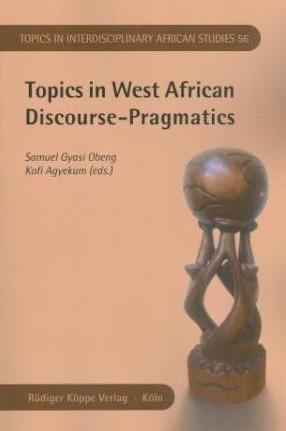
Topics in West African Discourse-Pragmatics
Edited by: Samuel Gyasi Obeng, Kofi Agyekum. With contributions by: Kofi Agyekum, Rebecca Atchoi Akpanglo-Nartey, Victor T. Alabi, Bright Amoah, Nana Amoah-Ramey, Evershed Kwasi Amuzu, Regina Oforiwah Caesar, William Dautey, Dora Francisca Edu-Buandoh, Taiwo Ehineni, Nancy Boahemaa Nkansah, Samuel Gyasi Obeng, Seth A. Ofori, Foluso Okebiorun, Kwabena Sarfo Sarfo-Kantankah, Esther Nana Anima Wiafe-Akenten, Abdulkadir Abubakar Zailani.
Series: TIAS Topics in Interdisciplinary African Studies Volume 56
202212 pp. Roman, 278 pp.
4 colour graphs, 3 colour tables, numerous tables and charts
Text language(s): English
Format: 160 x 240 mm
610 g
Paperback
€ 59.80
Buy 'Topics in West African Discourse-Pragmatics' as a downloadable PDF document directly from our online shop »
Order 'Topics in West African Discourse-Pragmatics' as print edition »
Language use in African communicational contexts is not merely a contest between linguistic and communicative competence. It is a contest of wits, of speaking without saying, of avoiding blame by circumventing the obvious and engaging in obliqueness and implicitness. It involves the use of implicatures, assumptions and entailments, engaging in double-voicedness and double wordedness (to give credence to what is said). Language use in Africa includes performing politeness without looking stupid or insincere, and of expressing feelings of emotions without being seen as emotional.
Indeed, saying that communicative context is important in accomplishing the aforementioned interactional tasks is an understatement, for not only is context the storehouse of, and gateway to communicative and pragmatic competence. It helps to determine who speaks and to whom, where to speak and how to speak, as well as what time to speak and when to give up on words.
CONTENTS
CHAPTER 1: Introduction
Samuel G. Obeng / Kofi Agyekum
CHAPTER 2: Parliamentary culture and language behaviour – A pragma-rhetorical study of unparliamentary language in Ghanaian parliamentary discourse
Kwabena Sarfo Sarfo-Kantankah / Dora Francisca Edu-Buandoh
CHAPTER 3: Compliment responses in Ga, Dangme and Ewe
Rebecca Atchoi Akpanglo-Nartey / Regina Oforiwah Caesar / Evershed Kwasi Amuzu
CHAPTER 4: Place naming in Akan societies – Circumstances and functional motivations
Seth A. Ofori / Samuel G. Obeng
CHAPTER 5: On the pragmatics of periodic updates on COVID-19 pandemic broadcast by president Nana Akuffo-Addo of Ghana
William Dautey / Kofi Agyekum
CHAPTER 6: On the pragmatics of interjections in Yorùbá
Foluso Okebiorun
CHAPTER 7: The pragmatics of Akan proverbs in the media
Bright Amoah / Esther Nana Anima Wiafe-Akenten
CHAPTER 8: Yoruba toponyms in Nigeria
Taiwo Ehineni
CHAPTER 9: African American music, Is it African enough? “Osibisaba” highlife and “folk spirituals” of Africa and Africans in the diaspora
Nana Amoah-Ramey
CHAPTER 10: The ‘text’ in the text – Religious intertextuality in matriculation speeches as a cultural product
Nancy Boahemaa Nkansah / Dora Francisca Edu-Buandoh
CHAPTER 11: Ethnopragmatics and communicative competence in Akan – Traditional and contemporary issues
Kofi Agyekum
CHAPTER 12: Yoruba names – Their meanings within the pragmatic theory of properhood
Taiwo Ehineni
CHAPTER 13: Indexicality in Yorùbá pregnancy taboos
Victor T. Alabi
CHAPTER 14: “Does Negative Politeness Exist in Hausa Social Request?”
Abdulkadir Abubakar Zailani
CHAPTER 15: Language and liberty in Akan juridical discourse – Exemplification from address and reference forms
Samuel Obeng
Under these links you will find publications by the contributors, studies of linguistic / discourse pragmatics and descriptions of further West African Kwa languages and cultures:
Accompanying material:
- African Sociolinguistic and Sociocultural Studies
(ISBN 978-3-89645-721-9 ) - Bridging the Language Gap
(ISBN 978-3-89645-890-2 ) - Conversational Strategies in Akan
(ISBN 978-3-89645-262-7 ) - Speech Acts and Speech Events in African Languages
(ISBN 978-3-89645-893-3 )
Cross-reference:
- African Linguistics in the 21st Century
(ISBN 978-3-89645-765-3 ) - An English-Efutu Dictionary
(ISBN 978-3-89645-513-0 ) - Contes et textes documentaires kwa de Côte d’Ivoire
(ISBN 978-3-89645-267-2 ) - Dictionnaire Fon–Français / Français–Fon
(ISBN 978-3-89645-472-0 ) - Gesprächsstrategien im Swahili
(ISBN 978-3-927620-41-4 ) - Language and Development
(ISBN 978-3-89645-720-2 ) - Le Maxi du Centre-Bénin et du Centre-Togo
(ISBN 978-3-89645-031-9 ) - Morphophonologie des langues kwa de Côte d’Ivoire
(ISBN 978-3-89645-545-1 ) - Prosodic Aspects of Baule
(ISBN 978-3-927620-14-8 ) - Studies in Ghanaian Languages and Linguistics
(ISBN 978-3-89645-366-2 ) - The Voice of the Elders
(ISBN 978-3-89645-278-8 )
| « back | Print version | [top] |
 Books
Books Audio
Audio Biographies
Biographies Series
Series Festschrifts
Festschrifts Journals
Journals